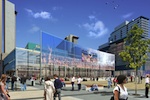Inside BBC Sport’s ongoing move up to Manchester and file-based HD
With the Olympics heading for the capital, it’s perhaps slightly ironic that BBC Sport is moving out of London and heading up to Manchester. But with a wholesale move towards file-based HD and 5.1 production as well, not to mention a dramatic improvement in working environment, it all makes sense. Besides, the BBC wheels were set in motion long before the Olympic rings started revolving.
And talking of wheels…BBC Sport’s Technical Executive, Charlie Cope, sits in one of the meeting pods (derided as hamster wheels in a typically robust piece of BBC-knocking in the Daily Mail) and talks though the architecture of the Sports Production System that weaves its way through the building. And talking of architecture, the building is flooded with light on a rare sunny summer’s day in Manchester and presents about as different a working environment as you can imagine from the stuffy, increasingly shabby bowels of BBC Sport’s old base down in London’s Television Centre.
“The fundamental change for us there is moving from a tape-based world to a file-based world: that’s the really significant part for us in terms of changing workflows and in change management itself,” explains Cope. “We’ve got a system based on some core EVS fast-turnaround architecture. We’ve got a Mediagrid bucket which is acting as a WIP (Work In Progress) area for us, and that’s working with FCP edit clients.”
Here are the bones of it: The system has 44 channels and is capable of 36 simultaneous ingests with 1500 hours of HD storage capacity. Material that is recorded onto EVS XS and XT3 servers can be edited instantly using either EVS’ Multicam LSM or IPDirector, and is then streamed to a 96TB Omneon MediaGrid via EVS XTAccess where a proxy is made available for all the journalists and producers to view the footage (around 200 when everyone has moved). Descriptive metadata is added to each clip at ingest, and more information is added whenever a clip is used or modified, allowing a comprehensive history of each clip to be built for the archive (which is an ongoing project of digitisation in itself).
A Work In Progress (WIP) area is equipped with Final Cut Pro edit stations for longer form editing work, which are all connected directly to the Omneon MediaGrid and interface into the EVS environment. Edit stations are dotted throughout the main production areas, while there are also FCP-kitted craft editing suites with extra monitoring and comms for extremely fast turnaround material. Playout is handled manually by EVS’ LSM remote controllers or IPDirector for playlist management and automated rundowns with ENPS’ NRCS.
“We haven’t tried to rebuild or do anything new from scratch,” says Cope. “We’ve tried to take a requirement we have in terms of how we want to make programmes and find the best fit for that. We’ll be producing programmes in an environment where content can be used and distributed far more effectively and the end result of that for the audience is that they should get a much broader product which is being driven by the widest possible access to content.”
Cope is coy about the reasons for choosing an EVS system, though its ability to provide a fast turnaround environment coupled with its penetration of the sports market can’t have done it much harm. And he resolutely refuses to be draw into any debate regarding FCP X (“There are far too many discussions going on for me to say anything on the record about that!”). But then it is still early days and there is much work to do still. Football Focus might already be being produced from the MediaCity Studios next door, but the BBC building won’t be fully crewed and the Sports Production System running in full on HD until November this year. Which, with the Olympics approaching rapidly, will be handy.
“From the point of view of 2012 it would be very hard for us not to have a base in Stratford, because that’s where all the infrastructure is,” Cope says. “What we will have though is this building here working flat out and being responsible for a very core part of our output.
“We’re in a good place as far as 2012 is concerned. There’s still a lot of work to do, there’s no question about it, but in terms of where we are now compared to where we normally are at this stage for a Summer Olympics, we’re in pretty good shape.”

